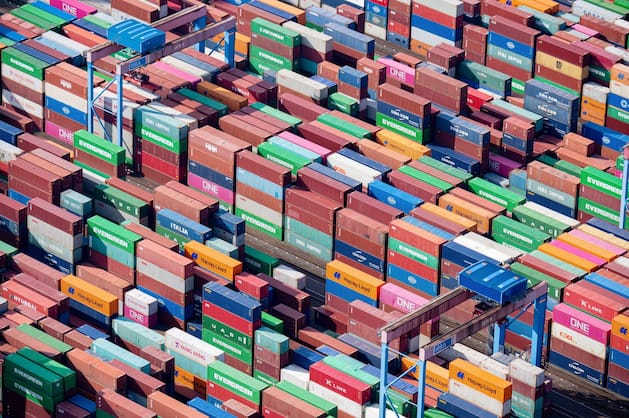In response to the Russian war of aggression against Ukraine, the West has passed numerous sanctions against Russia. Nevertheless, Germany’s exports to Russia have recently increased again – why is that?
After the beginning of the Russian war of aggression against Ukraine, more than 1,000 Western companies announced that they would limit their business with Russia. Many companies stopped production in Russia and halted all exports.
But despite the sanctions, Germany’s exports to Russia have recently increased again: According to the Federal Statistical Office, goods worth around one billion euros are delivered to Russia every month. Despite the war and sanctions, some companies continue to do big business with Russia.
In response to the Russian war of aggression against Ukraine, the EU has now passed nine sanctions packages. Numerous Putin confidants, as well as banks and companies, are affected by the sanctions.
In addition, there are certain import and export restrictions: high-quality electronics, technology for the energy industry or military goods may not be delivered to Russia. Crude oil, coal and steel are also not allowed to be imported into the EU from Russia.
Nevertheless, business is good for Putin – after all, some goods are exempt from the restrictions. The Federal Statistical Office has calculated that exports to Russia rose by almost 20 percent in November compared to the previous month.
Janis Kluge, economist from the Science and Politics Foundation, reports to Zeit Online that trade with Russia has now become more predictable for companies. Because many companies are now aware of which transport routes and which banks can be used for transactions. This is the reason why exports to Russia are now increasing again.
But which products are actually still being delivered to Russia? According to the Federal Statistical Office, pharmaceutical products make up the largest share of German exports. For humanitarian reasons, they are exempt from sanctions – after all, medical care for the Russian population must be guaranteed despite the war. In addition, food shipments are not affected by the sanctions – they, too, have increased year-on-year.
On the other hand, the share of machines, chemical products and cars in German exports has fallen significantly, even though they are still comparatively high. According to the Federal Statistical Office, German machine exports have almost halved: in 2021 machine exports would have amounted to 5.38 billion euros, while in 2022 they were only 2.67 billion euros.
Nevertheless, it cannot be ruled out that the machines supplied will be used directly in the Russian war against Ukraine. At least Russia also benefits enormously economically from German exports.
But stricter trade restrictions would be manageable for Germany in particular, because the share of exports to Russia is relatively small overall. The USA, France, the Netherlands and China are much more important German trading partners. And the German export surplus was also 11.3 billion euros in November 2022 alone, according to Zeit Online.
Economist Kluge explained to Zeit Online that sanctions would become less effective over time as ways of circumventing them were found. Kluge recommends that the EU should continue to adjust the Russian sanctions. Above all, sanctions would hit Russia if they could not order the sanctioned goods elsewhere.
If you know which devices at home use how much electricity, you can make targeted savings. Our e-paper shows which devices consume how much electricity for all common household appliances, from ovens and stoves to refrigerators and washing machines to TVs and WLAN routers. There are also a number of instant power-saving tips.








